“It is good that we are here.” St. Peter said these words to Jesus in the Gospel of St. Matthew, and we say them to you now. It is good that you are here. Whatever you are looking for, whatever your heart longs for, the Catholic Church is here to help you live life to the fullest.
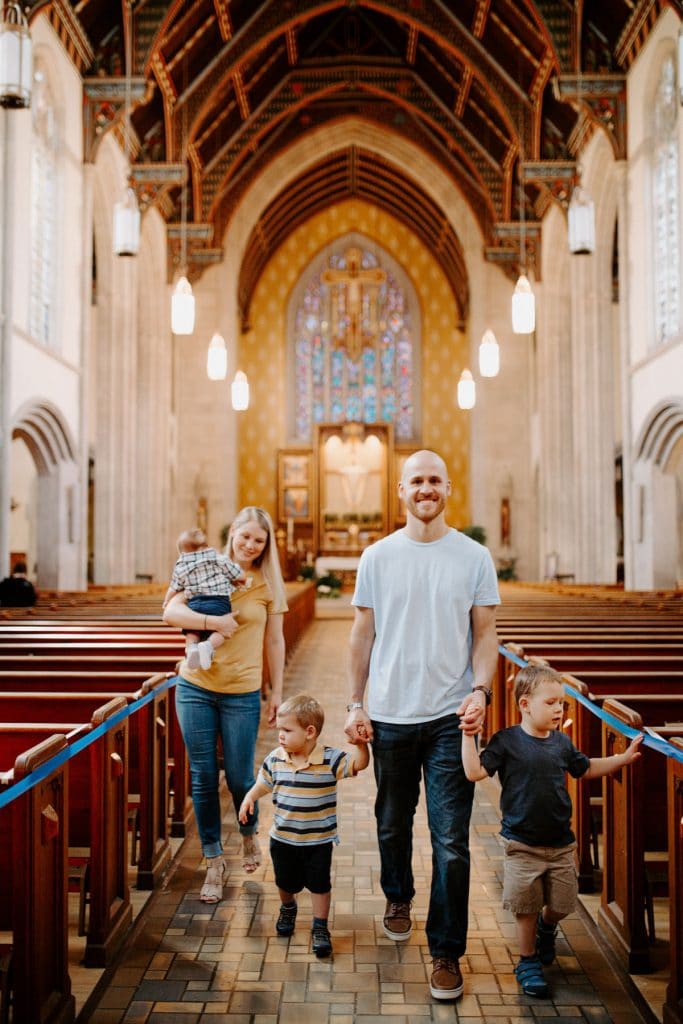
When you hear the word “church,” what comes to mind? A building? A religious institution? A priest or a saint?
The Church is, among other things, people. God’s people. The people He gathers in the whole world. The Church is lived in local communities and is seen and becomes real when her members pray together, especially at Mass. The Church is a family of believers. And this family is marked by certain characteristics (CCC 782):
That’s who we are. That’s the Catholic Church. And we want you to be a part of the family.
“There are not one hundred people in the United States who hate the Catholic Church, but there are millions who hate what they wrongly perceive the Catholic Church to be.”
— Venerable Fulton Sheen
Looking for answers? Here are answers to 10 common questions about Catholicism.
Jesus. Jesus started the Catholic Church in Matthew 16:18 when He said to the Apostle Peter, “And so I say to you, you are Peter, and upon this rock I will build my church, and the gates of the netherworld shall not prevail against it.” Before the Protestant Reformation in the 16th century, there was only one Christian Church: the universal Catholic Church.
Funny you should ask. The Catholic Church actually combined the Jewish scriptures with the definitive apostolic writings and formed it into the Bible as we know it today. For the first few hundred years after Jesus’ resurrection, we had no Bible. It wasn’t until the Council of Hippo (a council is a meeting of the heads of the Catholic Church) in 393 that an official list (canon) of Scripture was developed. The canon was reaffirmed for a final time at the Council of Trent, which took place between 1545 and 1563. Catholicism teaches us that the Bible is the divinely inspired Word of God. The Bible contains the truth of God’s revelation to man.
Just before Jesus ascended into heaven, He gave His final command—His great commission—to His apostles: “Go, therefore, and make disciples of all nations, baptizing them in the name of the Father, and of the Son, and of the Holy Spirit, teaching them to observe all that I have commanded you. And behold, I am with you always, until the end of the age” (Matthew 28:18-20).
For the first three centuries (a time we refer to as the early Church), Christianity basically grew on two pillars: tradition (handing down the teachings of Jesus) and apostolic succession (the witness and authority of the apostles). Tradition preserves the eyewitness accounts and personal testimonies of the apostles, and apostolic succession affirms the authority that Jesus gave to His apostles and their chosen successors to teach the faith. It was upon these two pillars that the early Church lived, Christianity grew and the canon of the Bible was established.
Jesus chose twelve men to be apostles. He taught them in a special way, gave them special assignments and empowered them with the Holy Spirit. They were the first priests. As the Church spread across humanity, the Twelve Apostles made new apostles. Today we don’t call these men apostles, we call them bishops.
Pick any bishop alive today, and you can trace him all the way back to one of the Twelve Apostles. Each bishop was ordained by another bishop who was ordained by another bishop ... all the way back to the Twelve. It’s one of the coolest things about Catholicism. Jesus made Peter the first pope when He told him, “You are Peter, and upon this rock I will build my church” (Matthew 16:18). You can read all about Peter’s ministry in Rome in the Acts of the Apostles.
From the earliest days the bishops recognized the primacy of the bishop of Rome, the successor to St. Peter, appealing to him to resolve any differences or clarify any teachings. The pope is a bishop that the other bishops elect to be their head. He is the bishop of Rome.
Let’s be clear: No. Catholics do not worship Mary or the saints.
Catholicism teaches that worship is due to God alone. God made that apparent in Exodus 20:3: “You shall not have other gods beside me.” We honor Jesus’ mother and certain men and women the Church recognizes as saints because their life witnesses point us to Jesus. Mary shows all people how to perfectly love Jesus and give one’s life over to God; the saints model the Christian life for us. When we “pray to” Mary or the saints, we are really asking them to pray for us. Just as you would ask a friend or family member to pray for you, we ask Mary and the saints — who are close to Jesus — to pray on our behalf.
The Catholic Church teaches that we are saved by God’s grace. We are not saved by our faith. We are not saved by our works. Grace is a free and undeserved gift from God accepted through faith. We can’t earn it. We can’t achieve it. We can’t buy it. We do, however, need to accept God’s invitation of salvation. Grace was won for us by Jesus when He died on the cross to redeem us from our sins. That grace is available to everyone. Faith and works are an integral part of the spiritual life and signs of our relationship with God. It is through our faith and works that we show we are Christians, that we show our love for God and our desire to receive the gift of grace He offers us.
God loves us and wants us to be happy. As a Church we are witnesses of God’s love for all people. We want everyone to experience the peace, joy and fullness of life that Jesus promises. Because we love you, the Church won’t compromise on the truth, even if that truth is uncomfortable or difficult to understand. We read in Scripture that Jesus welcomed everyone, even sinners, but He loved them too much to leave them in sin, calling them to “Go, and sin no more” (John 8:11). Jesus called Himself the truth, and truth is the only path to the happiness we all desire. Here are some truths revealed by God on which we cannot compromise:
In John chapter 6, Jesus gives a long speech called the Bread of Life Discourse. The most striking phrase in that whole speech is “eat my flesh and drink my blood,” which Jesus repeats several times:
“I am the living bread that came down from heaven; whoever eats this bread will live forever; and the bread that I will give is my flesh for the life of the world” (John 6:51).
“Amen, amen, I say to you, unless you eat the flesh of the Son of Man and drink his blood, you do not have life within you” (John 6:53).
“Whoever eats my flesh and drinks my blood has eternal life, and I will raise him on the last day” (John 6:54).
“For my flesh is true food, and my blood is true drink” (John 6:55).
“Whoever eats my flesh and drinks my blood remains in me and I in him” (John 6:56).
“Just as the living Father sent me and I have life because of the Father, so also the one who feeds on me will have life because of me” (John 6:57).
It kind of seems like Jesus was trying to make a point, doesn’t it?
The Eucharist is the most dearly held sacrament of the Catholic Church, and it is also the one teaching that makes us unique from every other Christian tradition. Catholics believe that when we receive the bread and wine at Mass, it is not a symbol of Jesus’ body and blood, but that it actually becomes Jesus’ body and blood. It may look like, taste like and feel like bread and wine, but it’s actual substance has changed into Jesus’ body and blood. “The Eucharist is the source and summit of the Christian life” (Lumen Gentium, 11).
Does this sound strange? Sure. Is it hard for many people to believe? Absolutely! Nevertheless, it was the belief of all of Christianity for the first 1,500 years of Christianity, up until the rise of Protestantism. We aren’t surprised that some Christians abandoned this teaching. Jesus covered this in His Bread of Life Discourse as well:
“Then many of his disciples who were listening said, ‘This saying is hard; who can accept it?’” (John 6:60).
“As a result of this, many of his disciples returned to their former way of life and no longer accompanied him” (John 6:66).
Jesus didn’t apologize for this teaching, and He didn’t run after the disciples who were leaving to tell them He was just kidding. He turned to the apostles with one question:
“Will you also leave?” (John 6:67).
The Eucharist is all about Jesus’ giving Himself entirely — body, blood, soul and divinity — to you so that you may be saved. Jesus asks you, just like He asked His apostles, “Will you leave also?” It’s up to you. Will you go, or will you respond as Peter did:
“Lord, to whom else shall we go? Only you have the words of everlasting life” (John 6:68).
When we die, God — the ultimate loving father who is perfectly merciful and perfectly just — will judge our souls. He knows the entirety of what we have done, what we didn’t do, why we did it, what we intended, what we knew and what we didn’t know. Based on His perfect understanding, love, mercy and justice, we will face one of three outcomes:
We go to hell not because we didn’t live rightly enough or didn’t live up to God’s expectations. It is God’s firm desire that all should be with Him in paradise. By Jesus’ sacrifice on the cross, the doorway to heaven is open to everyone. We go to hell if we refuse to accept God’s free gift of grace offered to us. As people sometimes say, “hell is locked from the inside.” Those who are there have separated themselves from God’s free gift of grace.
At the end of time, God will resurrect our bodies. Our glorified bodies will be reunited with our souls for eternity.
Let’s get technical for a moment. The Church defines a sacrament as an efficacious sign of grace, instituted by Christ and entrusted to the Church, by which divine life is dispensed to us through the works of the Holy Spirit.
Now let’s break that down. The sacraments are visible signs of the action God is taking in our lives. Jesus wanted to make God’s actions in your life visible because He knows we are physical beings — we experience through our senses. God wants us to actually experience His love and saving grace. Jesus instituted seven sacraments:
Each of these sacraments is a special moment when the Church is entrusted to do what Jesus commanded her to do, and, with the help of the Holy Spirit, we receive the grace to get to heaven.
As simply as we can put it, the sacraments are ways the Church helps you get to heaven.
“The Church exists for nothing else but to draw men into Christ, to make them little Christs. If they are not doing that, all the cathedrals, clergy, missions, sermons, even the Bible itself, are simply a waste of time. God became man for no other purpose.”
— C.S. Lewis
The oldest declaration of the Christian faith, the Nicene Creed, was adopted in 325 AD, even before the canon of the Bible was definitively closed. The leaders of the Catholic faith needed a method of proclaiming salvation that was shareable and memorable and retained the core truth of the Gospel and the teachings of the apostles. In 381, the Nicene Creed was expanded with additional points of doctrine. Catholics around the world continue to profess this form of the creed every Sunday at Mass.
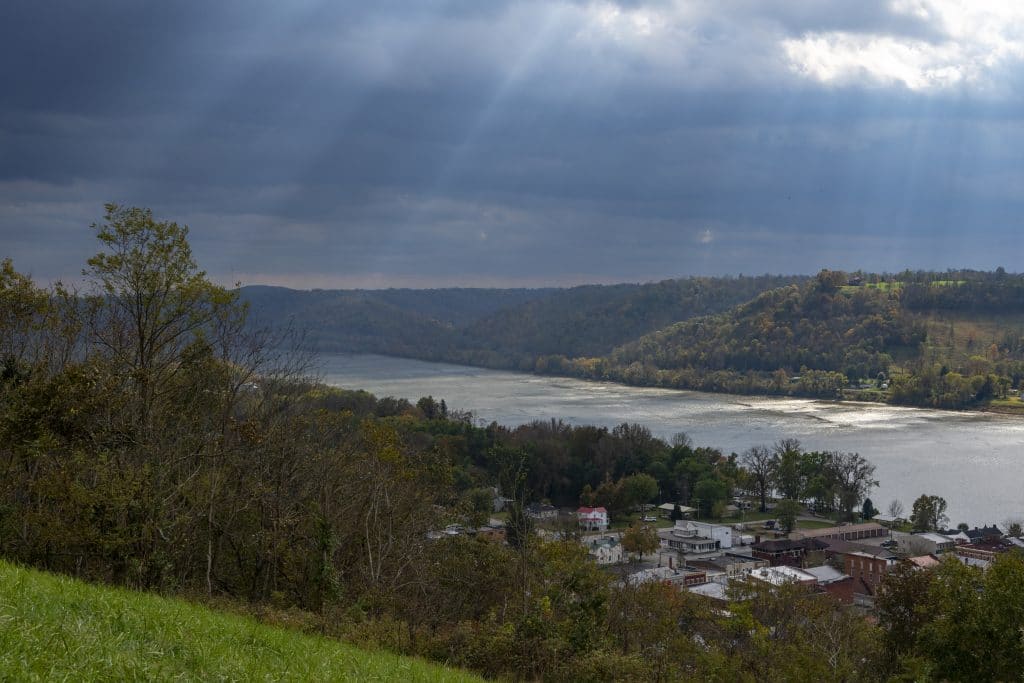
Catholics believe that God is the creator and sustainer of all things. God loves us and created us to be in relationship with Him in perfect harmony. We sinned and broke our relationship with God. We separated ourselves from Him and His plan for our lives. God created us for life and happiness, and sin always leads to death and suffering.
God the Father does not want us to suffer and die, so He sent His beloved Son, Jesus, to become man to redeem us from our sins. Jesus, who is God incarnate and not created, is both fully God and fully man. He is the Word through whom the entire universe was created. He came to us to heal our relationship with God through His life, death and resurrection and to establish the Church.
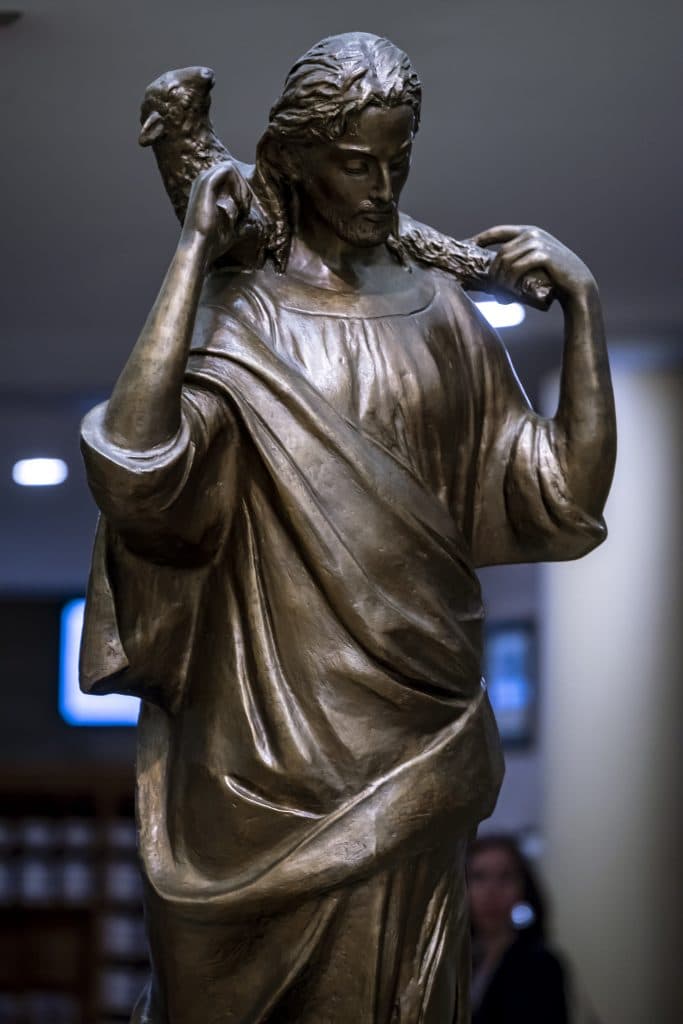
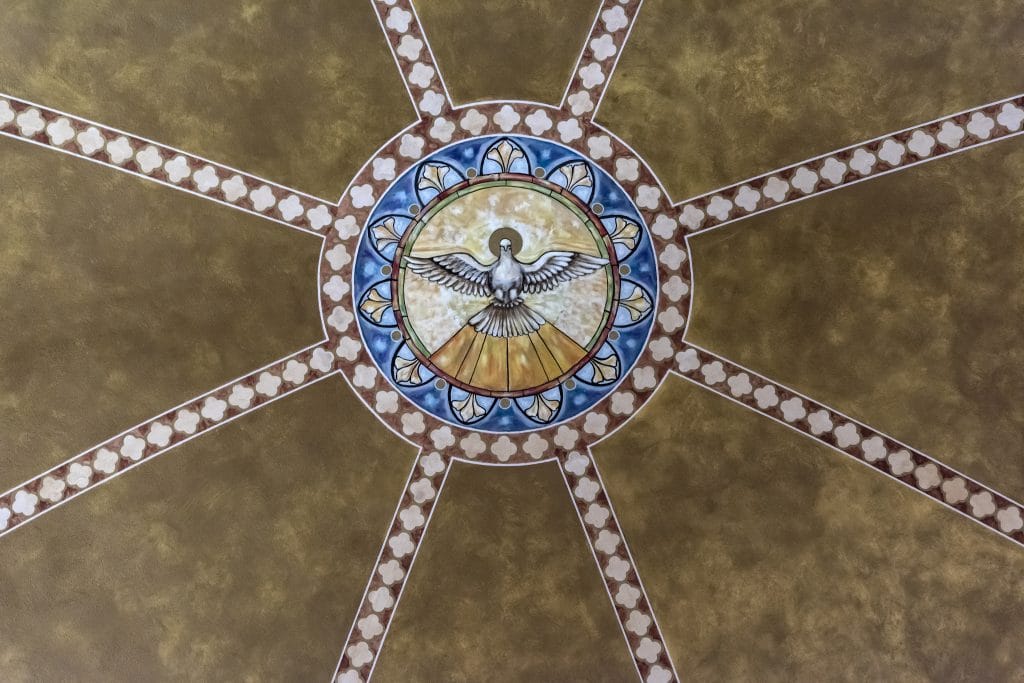
The Holy Spirit is also God, the third person of the Trinity. The Holy Spirit is our advocate, helper and provider. Jesus not only offered us the free gift of eternal salvation but also promised to send us a helper in choosing grace and living the Christian life. That helper is the Holy Spirit, who first came to the apostles on Pentecost and who comes to us through our baptism and confirmation. The Holy Spirit helps us to live according to God’s plan for our lives.
God also gives us the Church to be His sacramental presence on earth.
That Church is:
The Church is here to go out into the world, to help people enter into relationship with God, to baptize new believers and to teach people about Jesus.
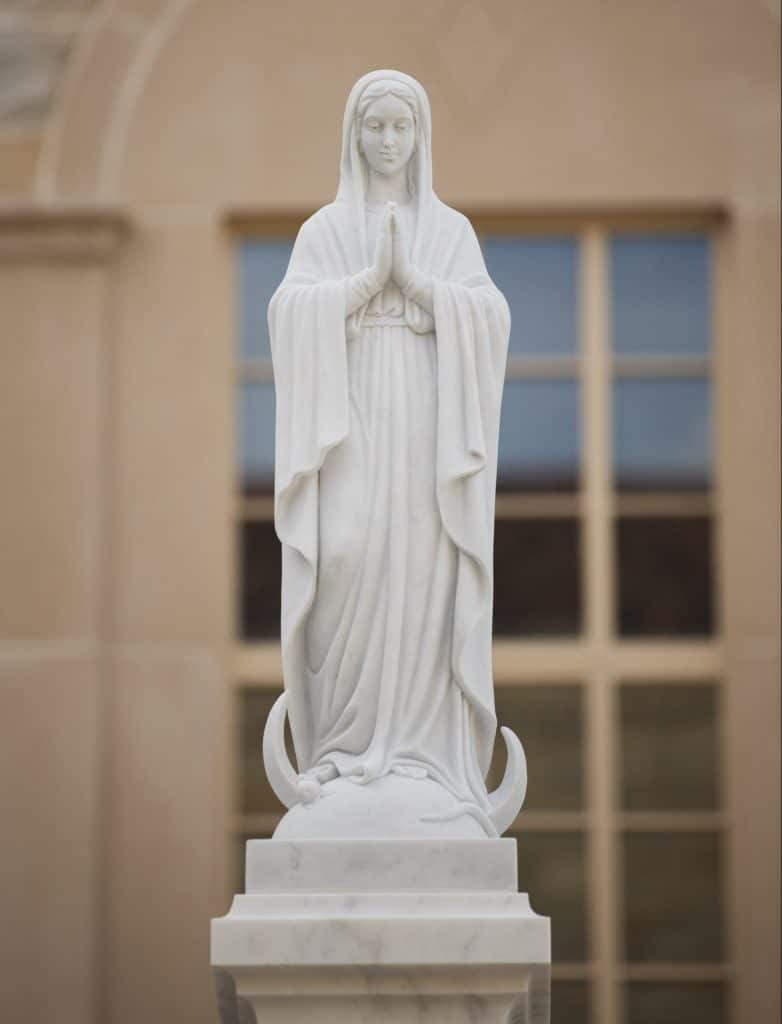
Ready to dig into more? Or maybe you’d like to find someone to talk with about the Catholic faith?